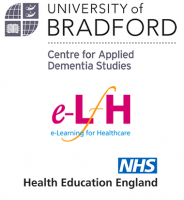Living Well with Dementia and Promoting Independence for Medical Doctors



This session will help you to understand how to support and promote a person's independence and meaningful involvement in their own daily life.
Learning Objectives
By the end of this session you will be able to:
- Explain the importance of knowing a person's physical, emotional and psychosocial needs, interests and preferences
- Discuss ways to promote a person's independence and meaningful involvement in their own daily life and know why this is important
- Specify how activities and environments can be adapted to suit an individual's changing needs
In this session, we will explore the importance and ways of maintaining a person's independence and understand how activities and environments can be adapted to suit an individual's needs.
This session has been mapped to the Dementia Training Standards Framework and is designed to support the Dementia Action Alliance Dementia Statements.
Before commencing this session you may wish to:
- Complete Module 1 - Introduction to Living with Dementia/Dementia Awareness (407-0030)
Ana is a Dementia Care Consultant and Trainer in person-centred care at the Centre for Applied Dementia Studies at the University of Bradford. She is module leader in the MSc Advanced Dementia Studies for the modules: Advancing Practice Skills and Research Methods.
Ana's research interests are focused on supporting the well-being of care assistants who work with people living with dementia in care homes. She is currently involved in research projects related to falls and vision and hearing loss in care homes for older people.


Gail is Professor of Applied Dementia Research and Director of the Centre for Applied Dementia Studies at the University of Bradford. She is also an occupational therapist having practised for 13 years before becoming involved in research.
Gail's research interests are focused on the development and evaluation of interventions, products and services designed to sustain/ improve independence and allow older people and those with dementia to live well.
- 03_06_10 ECG III
- Posted By eIntegrity Healthcare e-Learning
- Posted Date: 2024-11-02
- Location:Online
- This third and final session about the ECG discusses cardiac conduction and arrhythmias.
- 03_06_09 ECG II
- Posted By eIntegrity Healthcare e-Learning
- Posted Date: 2024-11-02
- Location:Online
- This session follows on from ECG I and presents the ECG as an electrical map of the heart. It details the abnormalities expected with myocardial infarction and left ventricular hypertrophy.
- 03_06_08 ECG 1
- Posted By eIntegrity Healthcare e-Learning
- Posted Date: 2024-11-02
- Location:Online
- This session explains how to record an ECG, the structure of the ECG and how to interpret the results. It further explains the use of the ECG in clinical practice.
- 03_06_07 Pulmonary function test interpretation
- Posted By eIntegrity Healthcare e-Learning
- Posted Date: 2024-11-02
- Location:Online
- This session will describe some of the basic respiratory investigations, and explain the relevance of the results obtained.
- 03_06_06 An alternative approach to acid-base abno...
- Posted By eIntegrity Healthcare e-Learning
- Posted Date: 2024-11-02
- Location:Online
- This session contains a link to the BJA Education article followed by a series of self assessment multiple choice questions.<br><br>The article will open in a new window or tab depending on your browser.<br><br> CPD credits are awarded by the RCoA for the







